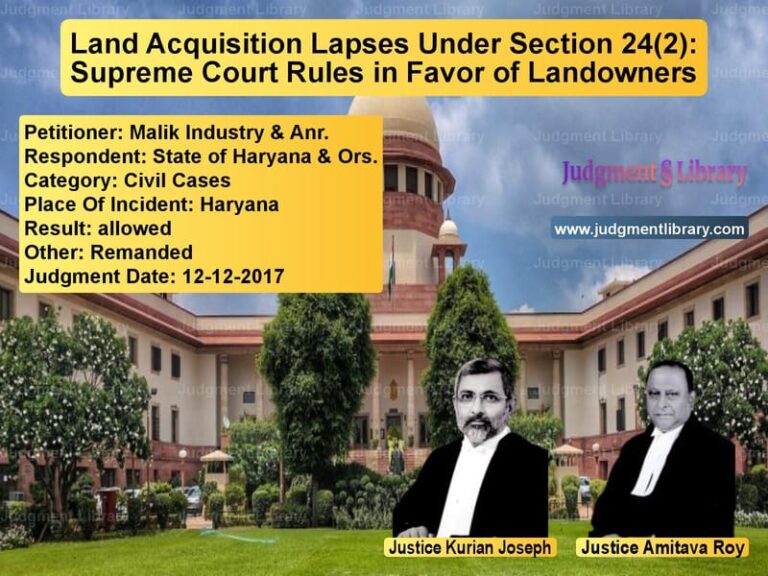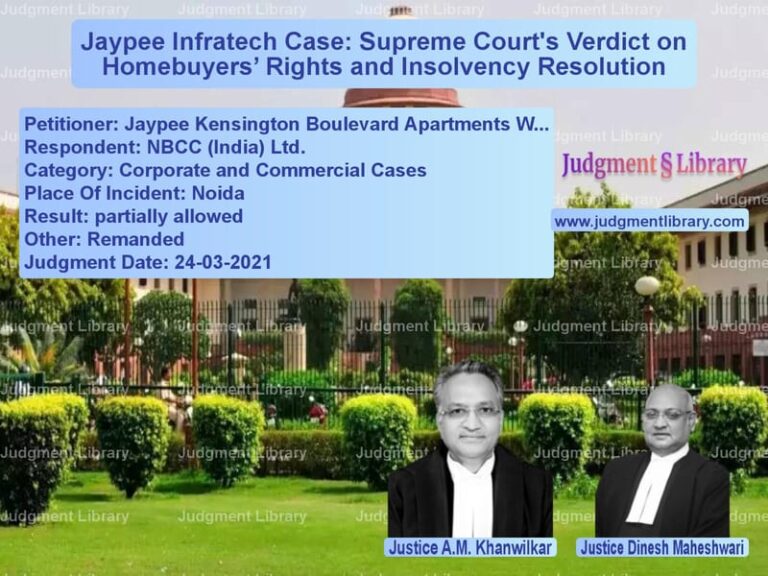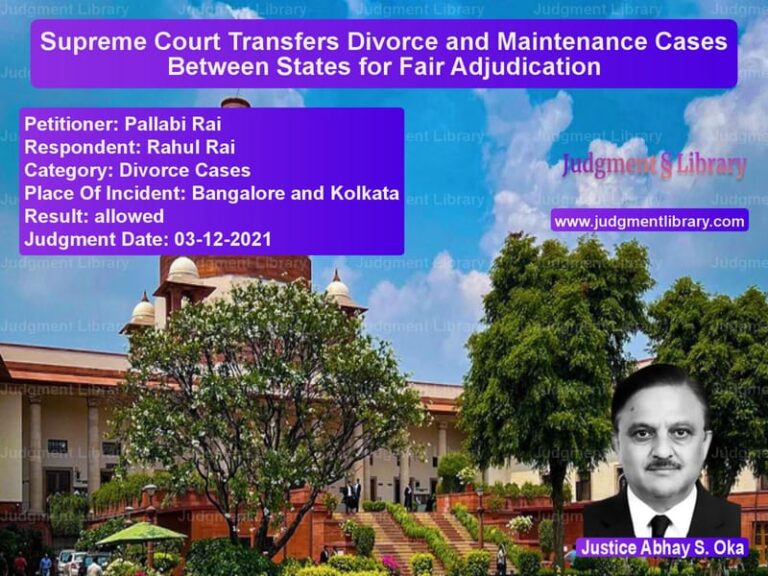Supreme Court Ruling on Tenant Eviction Under Tamil Nadu Rent Control Act
The Supreme Court of India delivered a crucial verdict in the case of M/s Alagu Pharmacy & Ors. vs. N. Magudeswari, which addressed the legality of eviction orders under the Tamil Nadu Buildings (Lease and Rent Control) Act, 1960. The case raised significant concerns regarding whether an eviction could be based solely on a compromise agreement or if it required the statutory grounds mandated under the Rent Control Act. The Supreme Court ultimately ruled that eviction must be based on legally recognized grounds and that a compromise agreement alone cannot justify removing a tenant.
Background of the Case
The dispute originated when the appellants, who had been tenants in a commercial property since 1998, entered into a lease agreement with the respondent landlord. The lease was set for a long-term period, and the tenants had been running a pharmacy in the premises for over a decade. However, in 2013, the respondent alleged that the lease agreement was fraudulent and demanded that the tenants vacate the premises. The appellants refused, leading to a protracted legal battle.
To resolve the dispute, the parties signed a compromise agreement under which the tenants agreed to vacate within a stipulated period. However, the tenants later alleged that they had been coerced into signing the agreement under pressure from the police and the landlord. Despite their claims, the trial court passed an eviction order based on the compromise agreement, directing the tenants to vacate the premises.
Proceedings Before the Lower Courts
The tenants challenged the eviction order before the appellate court, arguing that their eviction was illegal as it did not meet the statutory grounds for eviction under the Tamil Nadu Rent Control Act. The appellate court found merit in their plea and condoned the delay in filing the appeal, allowing them to contest the eviction.
Aggrieved by this decision, the respondent landlord moved the Madras High Court, contending that the appellate court should not have allowed the tenants to challenge the eviction order. The High Court ruled against the tenants, setting aside the appellate court’s order. The tenants then approached the Supreme Court, seeking justice.
Arguments Presented by the Appellants (Tenants)
- The eviction order was invalid as it was based solely on a compromise agreement and not on any legally recognized ground under the Tamil Nadu Rent Control Act.
- The compromise agreement had been obtained under duress, with police coercion playing a role in forcing them to sign.
- The trial court failed to examine whether a valid ground for eviction existed under the law before passing the eviction order.
- The appellate court had rightly condoned the delay in filing the appeal, given that the tenants were initially unaware of their legal rights.
Arguments Presented by the Respondent (Landlord)
- The tenants had voluntarily entered into the compromise agreement and had agreed to vacate the premises. They could not now claim coercion as an afterthought.
- The delay in filing the appeal exceeded 600 days, which was unjustifiable and should not have been condoned by the appellate court.
- The tenants had benefited from extended possession under the compromise agreement and were now attempting to evade their commitments.
- Legal proceedings should not be reopened after such a long period, as it would set a bad precedent and encourage tenants to delay eviction orders indefinitely.
Key Observations by the Supreme Court
- Eviction must be based on statutory grounds: The Supreme Court reiterated that under the Tamil Nadu Rent Control Act, an eviction order cannot be passed unless a valid ground exists, such as non-payment of rent, bona fide requirement of the landlord, or structural alteration of the building.
- Compromise agreements alone are insufficient: The Court emphasized that a compromise agreement cannot be the sole basis for eviction unless it aligns with the grounds prescribed under the Rent Control Act.
- Possibility of coercion and police pressure: The Supreme Court acknowledged the tenants’ argument that they had signed the compromise agreement under duress and that the involvement of police officials raised concerns about undue influence.
- Right to appeal should be protected: Given the serious implications of eviction, the Court held that tenants should have the opportunity to challenge orders obtained under questionable circumstances.
Supreme Court’s Final Judgment
The Supreme Court allowed the appeal filed by the tenants and reinstated the appellate court’s order permitting them to contest the eviction. The Court held that:
“Eviction under the Tamil Nadu Rent Control Act must be in compliance with the grounds specified under the statute. A compromise agreement that does not meet these criteria cannot be the sole basis for eviction.”
The Court also imposed a cost of Rs. 50,000 on the appellants for the delay in filing the appeal but ruled that they should not be evicted without due legal process.
Legal Implications of the Judgment
This ruling has far-reaching implications for landlord-tenant disputes in Tamil Nadu and across India. Key takeaways include:
- Strengthening tenant rights: The judgment reaffirms that tenants cannot be evicted arbitrarily and that eviction orders must conform to statutory provisions.
- Ensuring fair eviction proceedings: Courts must scrutinize eviction petitions on their merits rather than relying solely on compromise agreements.
- Balancing landlord and tenant interests: While landlords have the right to seek eviction, they must do so in accordance with due process.
- Preventing coercion in landlord-tenant agreements: The ruling discourages landlords from using pressure tactics to obtain eviction agreements.
Conclusion
The Supreme Court’s decision in M/s Alagu Pharmacy & Ors. vs. N. Magudeswari is a landmark ruling that reinforces the legal safeguards available to tenants under the Tamil Nadu Rent Control Act. By emphasizing that eviction must be based on statutory grounds and not merely on compromise agreements, the judgment upholds the rule of law and ensures that tenants are not unfairly displaced. It also provides clarity on the legal requirements for eviction, protecting both landlords and tenants from unfair practices.
Petitioner Name: M/s Alagu Pharmacy & Ors..Respondent Name: N. Magudeswari.Judgment By: Justice Abhay Manohar Sapre, Justice Uday Umesh Lalit.Place Of Incident: Coimbatore, Tamil Nadu.Judgment Date: 14-08-2018.
Don’t miss out on the full details! Download the complete judgment in PDF format below and gain valuable insights instantly!
Download Judgment: Ms Alagu Pharmacy & vs N. Magudeswari Supreme Court of India Judgment Dated 14-08-2018.pdf
Direct Downlaod Judgment: Direct downlaod this Judgment
See all petitions in Landlord-Tenant Disputes
See all petitions in Judgment by Abhay Manohar Sapre
See all petitions in Judgment by Uday Umesh Lalit
See all petitions in allowed
See all petitions in supreme court of India judgments August 2018
See all petitions in 2018 judgments
See all posts in Civil Cases Category
See all allowed petitions in Civil Cases Category
See all Dismissed petitions in Civil Cases Category
See all partially allowed petitions in Civil Cases Category







